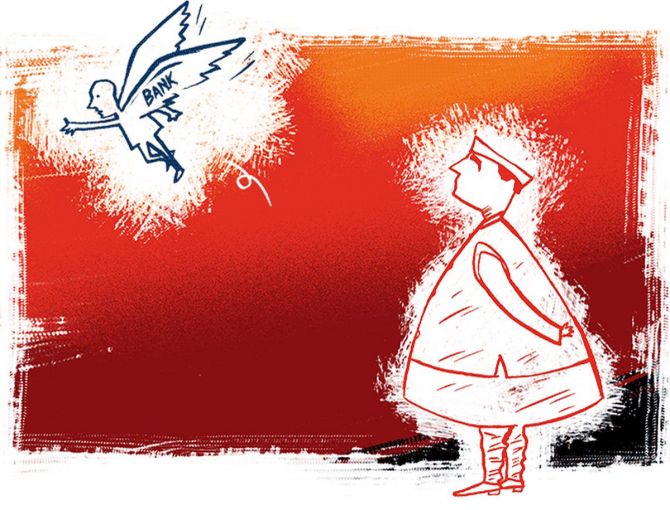The only feasible way to have a healthy banking sector could be making it mostly private, along with two or three large, better-run government banks, suggests T N Ninan.

Whether one likes it or not, Indian banking is headed the way of telecom and aviation.
Private entities will walk away with the cream, leaving mostly unviable entities in the public sector.
And all the king's horses and all the king's men will not be able to save Humpty Dumpty from this fate.
The private banks have a better net interest margin (3.4 per cent vs 2.4 per cent for public banks); lower costs (a wage bill that is 8.7 per cent of income, compared to 13.8 per cent for public banks); and therefore continuing profitability even as public banks have lost money for the last five years.
More losses will come when the pandemic-related moratorium and other shock absorbers are taken away.
The government's banks can't change their cost and revenue structures, or find the capital needed to reverse relative growth trends vis-a-vis private banks.
So it is virtually written in the stars that private banking will continue to grab a bigger share than public banks and corner the most bankable sectors, the best loan clients and the cream of the deposit-taking business.
The state of public banks has meant that banking no longer supports the economy as it should.
Lending in relation to gross domestic product has shrunk from about 60 per cent to just over 50 per cent in the last few years.
It would have been worse if the private banks, with their lower provisioning and better capital adequacy, had not grown their books faster than public sector banks.
These latter now account for only 60 per cent of banking assets, down from 72 per cent five years ago.
The king, or the State, has tried many things to reverse these trends: Recapitalisation involving unconscionable sums of taxpayer money, a Banks Board Bureau to select the best CEOs, merger of weak banks with stronger ones, new disclosure norms to enforce transparent accounting, a new bankruptcy process, regulatory forbearance during the pandemic... Some of this has helped, but not by enough to prevent the private banks from steadily increasing their share of the pie.
The logic of this transition from public to private gets lost sight of when the government feels pressured to come up with new 'solutions' not tried so far.
Like the apparently revived idea of a 'bad bank that will take over the bad assets of public banks.
Except that the transfer of such assets will have to be at appropriate discounts of perhaps up to 80 per cent of their original value.
This will automatically increase write-offs and losses, unless there is accounting fudge.
The second purported solution is a bank investment company to hold the shares of government banks, thereby separating ownership of government banks from the government.
Such supposedly arm's length structures rarely work.
It is hard to conceive of a bank investment company enforcing the discipline and performance yardsticks, or introducing the pay structures and aggressive commercial orientation, of the best private banks.
And don't forget the coming challenge from fintech companies, which hope to swallow the business of leaden-footed banks for breakfast.
The only feasible solution is (or was) privatisation.
With large business houses debarred from owning banks, the entities most capable of taking on the job of salvaging troubled institutions are the existing private banks and the large shadow banks that should be encouraged to become banks.
But it will be a tough job making the sale palatable to potential buyers without getting the public suspicious about underpricing, since public banks are almost uniformly quoting at discounts to book value.
A two- or three-stage sale process may do the trick, with successive offloading of shares at stepped-up prices.
Still, some government banks may find no takers.
For them, it is already too late for even privatisation.
Their balance sheets will have to be shrunk.
Eventually, we may get a healthy banking sector that properly serves the economy if it is mostly private, along with two or three large, better-run government banks.
One could accept this outcome, or continue the game of pretend.
Disclosure: Entities controlled by the Kotak family own a significant stake in Business Standard newspaper, where this column first appeared.
Feature Presentation: Aslam Hunani/Rediff.com











